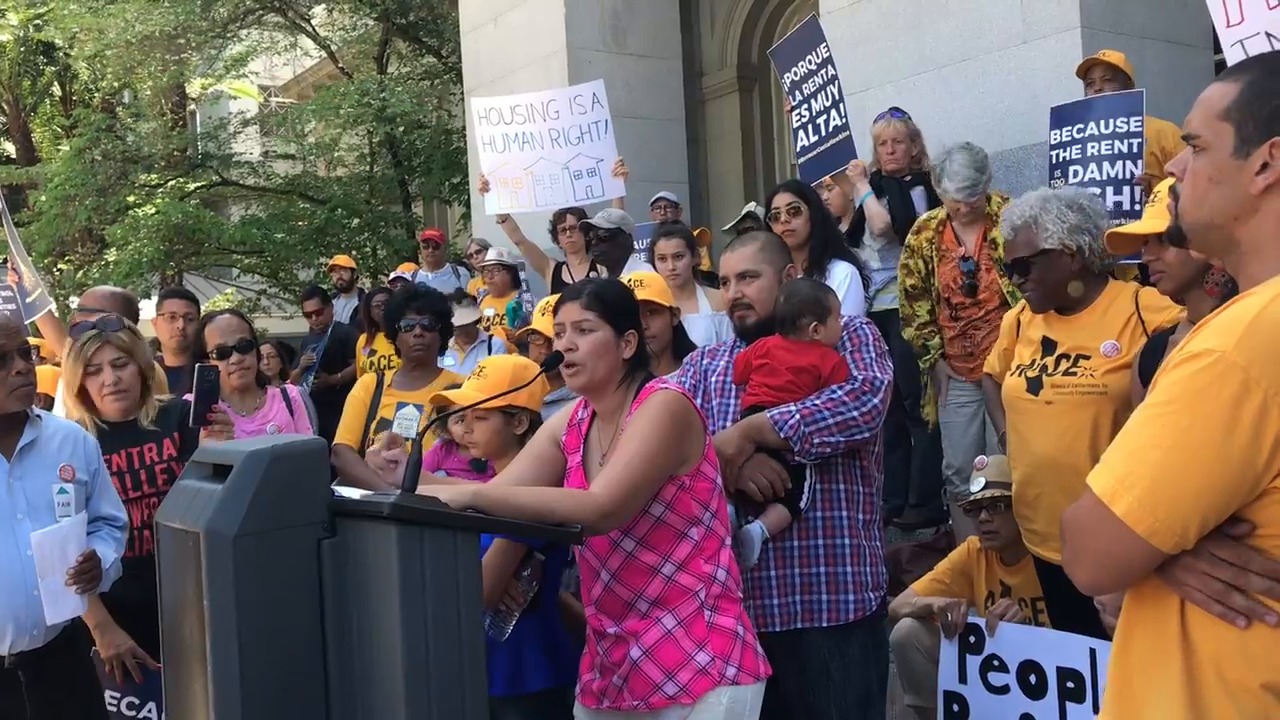There have been spirited discussions on rent control throughout the Bay Area, but we can’t seem to recall a debate so cantankerous as the one leading up to Richmond’s approval of its rent control and just-cause-for-eviction ordinance.
In asserting their voice, tenant advocates mounted a show of force with a sea of yellow shirts, toting signs and raring to testify. Decrying skyrocketing rents and increased gentrification, their cause was ultimately successful when, in 2016, the city became the first Bay Area city to approve rent control in 30 years.
It’s not the most entertaining of videos, but Richmond City Manager Bill Lindsay provides a good lay of the land in this community workshop at a time when the city was in the implementation stage of the ordinance.
Although tenant advocacy groups and labor unions architected the law in large part, landlords were also well represented in the dialog and councilmembers sympathetic to owners weaved in protections for this group. With that backdrop, let’s get into the nooks and crannies of the law.
The Richmond Fair Rent, Just Cause for Eviction, and Homeowner Protection Ordinance has the dual purpose of capping the annual amount a landlord can increase the rent and protecting tenants from eviction without a just cause.
The ordinance applies to buildings with two or more residential units that have a certificate of occupancy prior to February 1, 1995. Put differently, Richmond landlords who have multiple units in a building that was built before 1995 are likely subject to Richmond Rent Control.
Single-family homes and condominiums are exempted from the ordinance, at least for the time being. In an earlier article, we noted that efforts to repeal the Costa Hawkins Act are gaining steam and after the Democratic Party has backed the ballot measure, its repeal is more than a whispering possibility. Other exceptions may apply and when in doubt, contact our office.
Rent Increases
The Richmond Rent Board is the body that establishes permissible rent increases in units covered by rent control and is pegged to the annual percent change in the Consumer Price Index for all Bay Area consumers. Bornstein Law has long maintained that the CPI is not a good barometer because this statistical estimate keeps a pulse on the prices of consumer goods and does not adequately reflect the rising costs of operating a rental business, but it “is what it is.”
At their meeting on June 20, 2018, Rent Board members announced the 2018 Annual General Adjustment (AGA) rent increases at 3.6%. Effective September 1, 2018, the Maximum Allowable Rent for tenancies in effect prior to September 1, 2017, will increase by 3.6%.
Informing tenants of the rent increase
A common denominator in rent control rules we see at Bornstein Law is that even if landlords are compliant with the law, proper notice must be given to tenants. For example, Oakland’s Rent Adjustment Program affords tenants substantial protections before they even move in – Oakland landlords must give income residents formalized notice of their rights in the form of a RAP notice.
Similarly, RICHMOND, CAL., MUN. CODE § 11.100.060(g) requires that Richmond landlords provide a rent increase notice to the tenant which includes a brochure prepared by the Richmond Rent Board fully describing the legal rights of the tenants. If the landlord does not provide this required notice and information packet, the rent increase is void.
Relocation Payments
One of the most controversial aspects of the law is the establishment of relocation fees, running upwards to $16,000, that the owner could have to pay to tenants when the rental property is sold or it becomes owner-occupied.
Petitions a free for all
The Richmond Rent Board has an open-door policy in hearing landlords and tenants.
It seems that compared to other Bay Area locales, Richmond takes a refreshing posture in acknowledging the voice of landlords. With the rising costs of doing business, we’ve noted that other cities have frowned upon passing on operating costs to other tenants, but Richmond takes a more balanced approach by allowing owners to absorb the costs of property taxes, capital improvements, and other increases in the housing services provided. We hasten to say that with due process and transparency in mind, the tenant can chime in when the landlord petitions the Richmond Rent Board.
Disgruntled tenants can also initiate petitions of their own to air out their grievances, including a Petition Rent Ceiling Downward Adjust and an Administrative Complaint.
Parting thoughts
Like most other topics we cover, this piece only scratches the surface, leaving many issues unresolved, including Ellis Act evictions, roommates, and owner move-in evictions. Ironically, while we design to educate the rental housing industry, our articles tend to generate more questions than answers – contact our office to fill in the blanks.




